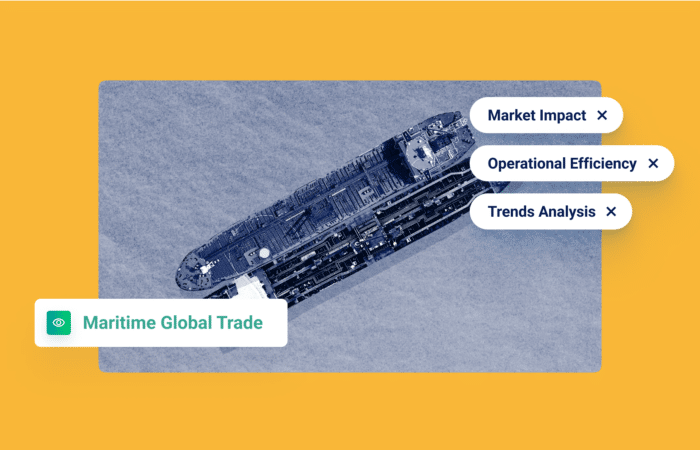Financial Crime Risk
What is financial crime risk?
Financial crime risk in the maritime industry refers to the possibility of financial crimes being committed during the course of maritime trade. This can include a range of illicit activities, such as money laundering, fraud, and sanctions violations.
The maritime industry is particularly vulnerable to financial crime, due to its international and decentralized nature, which can make it difficult to track and regulate the movement of goods, people, and money. Financial institutions, who are critical players in the importation and exportation of goods and commodities, are particularly exposed and often require extensive risk management tools to safely enable trade activity and prevent illicit activity.
Some examples of financial crime in the maritime industry include the use of ships to transport illicit goods, such as drugs, weapons, stolen goods, and counterfeit products, as well as the manipulation of financial transactions to evade taxes, launder money, or finance terrorist activities.
To manage financial crime risk in the maritime industry, companies may implement various measures: conducting due diligence on business partners, implementing compliance programs to detect and prevent financial crime, and monitoring financial transactions to detect suspicious activity.
Additionally, international organizations such as the International Maritime Organization (IMO) and the U.S. Treasury’s Office of Foreign Assets Control (OFAC) provide guidance and recommendations to help organizations manage financial crime risk and sanctions in the maritime industry.

What is financial crime risk management?
Financial crime risk management in the maritime industry involves a range of practices and measures that are designed to help companies identify, assess, and mitigate the risk of financial crimes, such as money laundering, fraud, and sanctions violations. Effective financial crime risk management in the maritime industry typically involves a combination of policies, procedures, and technology solutions that enable companies to monitor, analyze, and report on potential financial crime risks.
Some key elements of financial crime risk management in the maritime industry include:
- Due diligence: conducting thorough due diligence on business partners, customers, and all seven levels of ownership, up to the ultimate beneficial owner (UBO), to discover hidden connections between any company, individual, and high-risk vessel. This includes screening any person or company for sanctions lists, global watchlists, adverse media, and politically-exposed persons (PEPs). Effective due diligence ensures they are legitimate and do not pose a financial crime risk.
- Compliance programs: developing and implementing compliance risk management programs that include policies and procedures to detect and prevent financial crime, as well as training employees on how to identify and report illicit activity, to confidently and safely do more business.
- Risk assessment: conducting regular risk assessments to identify deceptive shipping practices, which are constantly evolving and becoming more sophisticated. These behaviors include GNSS manipulation, flag hopping, dual transmission, potential financial crime risks, and adjusting risk management measures accordingly.
- Technology solutions: proactively mitigate sanctions compliance risk by utilizing technology solutions, such as artificial intelligence (AI), to detect potential financial crime risks and identify violations before designations occur, with real-time insights and 75% less false positives.
- Reporting and record-keeping: maintain accurate records of financial transactions and reporting suspicious activity to relevant authorities, as required by law.
By implementing effective financial crime risk management practices, companies in the maritime industry can help protect themselves from financial losses, reputational damage, and legal and regulatory sanctions.
Financial crime risk & sanctions compliance
Financial crime risk and sanctions are closely connected in the maritime industry. Sanctions are a key tool used by governments to combat financial crime, including money laundering and the financing of terrorism. They typically involve restrictions on trade and financial transactions with countries, individuals, or entities that are deemed to pose a risk to national security, or international peace and stability.
In the maritime industry, sanctions can have a significant impact on trade and financial transactions, as many goods are transported by sea and involve complex international supply chains. Companies that operate in the maritime industry may be subject to both national and international sanctions, and are required to comply with sanctions laws and regulations to avoid legal and financial penalties.
Non-compliance with sanctions regulations can lead to significant financial and reputational damage for companies, including fines, penalties, and the loss of business relationships. To manage sanctions risk, companies in the maritime industry may need to implement a range of measures, such as screening transactions and business partners against sanctions lists, conducting enhanced due diligence on high-risk transactions, and implementing sanctions compliance programs that include policies and procedures to detect and prevent violations.
Overall, financial crime risk and sanctions are closely intertwined in the maritime industry, and companies need to be aware of the risks and take appropriate measures to manage them effectively.
Looking to the future
In today’s globalized economy, financial crime risk management is a critical concern for organizations across all industries. However, for companies in the maritime industry, where international trade plays a significant role in their operations, the risk of financial crime can be particularly high. By effectively managing financial crime risks, companies can not only protect their financial interests, but also safeguard their reputation and avoid legal and regulatory penalties.
With the right solution and strategy, companies can proactively mitigate risks associated with financial crime and strengthen their overall compliance posture. As international regulations continue to evolve, companies must remain vigilant and stay up-to-date with best practices and emerging trends in financial crime risk management.















